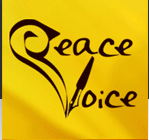Our former Peace Fellow Jeanine Russaw was published in PeaceVoice (Oregon Peace Institute) last month, talking about the #BringBackOurGirls campaign and the effectiveness of online activism. Check out the full article below and here.
Global Justice for Our Girls: Hashtags and Selfies Still Aren’t Enough
by Jeanine Russaw
Thirty. Twenty. Fifteen.
She puts up a good fight: struggling, kicking, and biting are just par for the course. Not to mention, she’s used to it; it’s happened before. Ten. Five. She lets out an agonizing scream. Zero.
It’s too late. She’s gone. Thirty seconds is all it takes for a girl to be taken from her world and everything she knows. For the276 Nigerian girls kidnapped by the Boko Haram in April 2014, life was forever changed in 30 seconds and they are not even aware of the barely consistent tweeting and micro-blogging that has been done on their behalf. Sixty-three of the girls escaped earlier this month, and there are Nigerian governmental attempts to provide reparations. But there is a lot more to be done for the women and girls remaining – in Nigeria and beyond – and hashtags and selfies just aren’t enough.
“Every year, at least another two million girls worldwide disappear because of gender discrimination.” Nicholas Kristof and Sheryl Wu Dunn found this distressing statistic on their quest to shed light on deadly sexism with their 2009 book, Half the Sky: Turning Oppression into Opportunity for Women Worldwide.
The chilling reality of sexism in the developing world presented by Kristof and Wu Dunn is one that often keeps me awake at night. Perhaps the most troubling is the lack of meaningful action taken by my fellow Americans who, aside from the occasional hashtag #BringBackOurGirls, or a selfie with a poster, are not immune to apathetic attitudes in the face of blatant sexism – even in their own backyards.
Of course, hashtags and selfies by themselves are not inherently bad. Rather, the problem lies in what they represent. This form of citizen media is indicative of nothing more than a fad and when the trend fades away, so does the concern. Since when did it become okay for the lives of innocent young women to be viewed as “the next big thing?” All of a sudden, it was considered “hip” to care about the wellbeing of women and post a selfie with the hashtag #BringBackOurGirls – as if that is actually going to transport the ladies to a safe home with their families.
The rising use of this hashtag occurred with First Lady Michelle Obama’s own influential selfie. While there can be no fault found in the Obama’s support for the delicate situation, sensationalism can often blind us to the issue at hand. We become infatuated with the idea of taking some immediate military action as opposed to actually acting on our ideals. Hashtags and bombs are not the only options.
I’m not suggesting that we have to get on the next plane heading to Nigeria and demand to meet with Boko Haram leader Abubakar Shekau, but we can at least take the time to become educated about the true goings on of Boko Haram beyond Twitter and #BringBackOurGirls. Only then can we think logically about our collective role in the struggle.
There are many options we can take to help provide justice for girls and women in Nigeria and worldwide, and we should feel compelled to do so. Of most importance is to actively align ourselves with organizations and activists who are already working against global oppression of women. Such as She’s the First, which sponsors worldwide female education with the intention of “creating our next generation of global leaders.” Another example is Girl Up, which has been active in bringing awareness to ongoing gender discrimination by “uniting girls to change the world.” Then there is my personal favorite, Kristof and Wu Dunn’s Half the Sky Movement, which “turns oppression into opportunity for women worldwide.”
And, our fight against gendered violence can’t stop at man-made, national boundaries. As the release date of Kristof and Wu Dunn’s latest book, A Path Appears, approaches, we must realize a serious injustice: that geographic location is often the only difference between our suffering and their suffering. As a young American woman, I am no different than those of Nigerian descent. That could just as easily have been me – or you – had I been born of Nigerian parents as opposed to Americans ones. Remove the geographic, genetic lottery and an injustice to one looks a lot more like an injustice to all.
How do we make the world safer and eliminate the terror for those of us born without a Y chromosome? No, the answer is not:Let’s hashtag a selfie about it! As well, the answer is not: Let’s send over some advisors and weapons! Our fight against global sexism and gendered violence must remain resolute, but preventing and eliminating gendered injustices, at home and abroad, must center on active participation in and full support of civil society movements already engaged in the struggle.
Jeanine Russaw (@jMarieRussaw), writing for PeaceVoice, is a multimedia journalist, freelance writer and a senior at Hofstra University majoring in journalism and global studies and concentrating on human rights reporting and female/minority empowerment.
